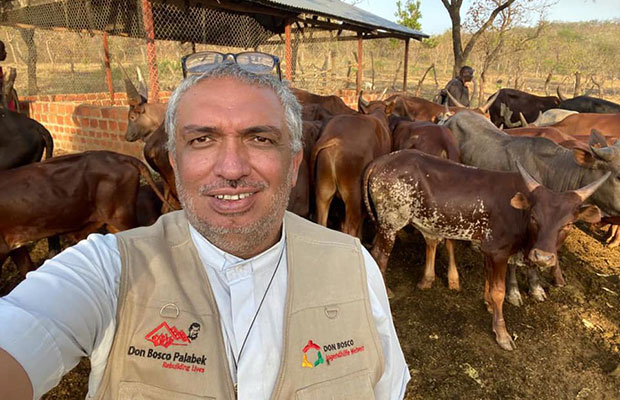
Making a Difference in Refugee Communities
Education is one of the most effective tools young refugees can use to rebuild their futures. And yet, around the world, millions of them remain deprived of the opportunity to obtain an education. Undaunted by statistics, Salesian missionaries at the Palabek Refugee Resettlement Camp in northwest Uganda focus on the individuals behind these numbers—a strategy that’s making a difference, one young person at a time.
According to official estimates, refugee children are five times more likely to be out of school than their non-refugee peers. Only 24 percent of refugee adolescents attend secondary school, and the reality is even more abysmal in low-income countries—where that number is only nine percent. Globally, 84 percent of non-refugee adolescents attend school.
The numbers, while discouraging, contradict the deep motivation among refugee youth to overcome their circumstances. At Palabek, this motivation is undeniably present and immediately obvious.
“At the technical and vocational level, many young refugees want to work. More specifically, they want to learn a trade, that in most cases, allows them to return to South Sudan and contribute to the reconstruction of their country, destroyed by many years of violence and war,” explains Father Ubaldino Andrade, rector of the Salesian community at Palabek.
Established in 2017, the camp serves more than 51,000 refugees and asylum-seekers, the vast majority of whom are from South Sudan. Salesian missionaries first arrived in February 2018 and have remained the only humanitarian organization with a permanent presence there.
“That’s why our missionaries are so committed to educating youth within the Palebek community,” says Father Gus Baek, director of Salesian Missions. “It’s not an abstract goal. These young people are neighbors and friends, and their eagerness and potential are impossible to ignore.”
Within the camp itself, missionaries offer primary, secondary and technical education. Currently, about 100 children attend primary school and 54 go to high school. Additionally, 25 older youth participate in programs at the Don Bosco Vocational Training Center where they learn skills in sewing, solar energy, mechanics, agriculture, construction and hairdressing.
Missionaries also help youth attend school outside the camp. Those who do so often must walk between 6 and 9 miles each day just to get there. Through a recently established sponsorship program, missionaries are able to place students in safe boarding facilities located closer to their schools, where they’re able to live, study, eat nutritious meals, and participate in recreational activities.
Older youth who want to learn technical skills not offered at the Don Bosco Training Center can participate in a separate sponsorship program—which helps them access other centers outside of Palabek where they can learn plumbing, blacksmithing, driving, animal care and other marketable skills.
Inside and outside of Palabek, these educational opportunities exist because of the generosity of our donors. And the impact is measurable.
“For example, we have the case of a student who learned mechanics and then took a driving course,” says Fr. Ubaldino. “Now, she has returned to South Sudan and is working as a driver with a salary of $700 per month, far above the minimum wage in Uganda. We are very grateful to our donors who have helped many children and young people make the dream of a quality education come true, allowing them and their families to live a more dignified life.”
Our mission brings education to youth living in refugee camps—so they can build better futures for themselves, and their countries. What’s your mission?
Learn more about our work in Uganda.

